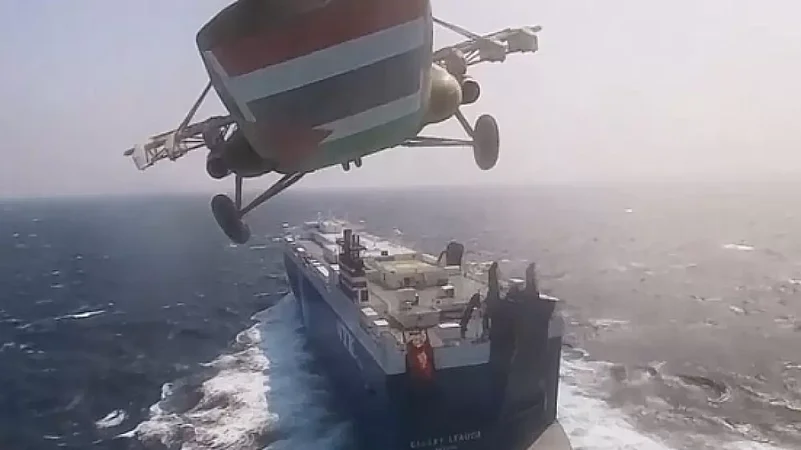The Pentagon on Monday announced its plans to expand its maritime force in the Red Sea, following a spate of attacks by Houthi rebels on ships heading to Israeli ports.
The announcement comes after two ships were struck by Yemen’s Houthi militants near the Bab el-Mandeb Strait on Friday, AP reported.
The Houthi military spokesperson, Brig. Gen. Yahya Saree, said in a statement claiming responsibility for Friday’s attacks, “The Yemeni armed forces confirm they will continue to prevent all ships heading to Israeli ports from navigating in the (Red Sea) until they bring in the food and medicine that our steadfast brothers in the Gaza Strip need.”
The escalating attacks on vessels have also led to two shipping companies, Maersk and Hapag-Lloyd, putting a pause on all journeys through the Red Sea.
What is Operation Prosperity Guardian?
The US Department of Defense on Monday announced their decision to establish Operation Prosperity Guardian, a new multinational security initiative focusing on security in the Red Sea.
The operation is aimed at fighting missile and drone attacks by Houthi rebels on vessels transiting through the corridor and will be coordinated by Combined Task Force 153 set up in April 2022 to improve maritime security in the Red Sea, Bab el-Mandeb and the Gulf of Aden
“The recent escalation in reckless Houthi attacks originating from Yemen threatens the free flow of commerce, endangers innocent mariners, and violates international law,” Secretary of Defense Lloyd J. Austin III said in a statement.
The operation will see the participation of many countries looking to address security challenges in the Red Sea including the United Kingdom, Bahrain, Canada, France, Italy, Netherlands, Norway, Seychelles and Spain.
“Countries that seek to uphold the foundational principle of freedom of navigation must come together to tackle the challenge posed by this non-state actor,” the statement read.
Why are Houthi rebels attacking ships transiting through the Red Sea?
The Iranian-backed Houthi rebels in Yemen have intensified their attacks in the Red Sea since the onset of Israel’s war on Gaza. While they would sporadically target ships in the region before, the frequency of these attacks has notably risen since October.
The Liberian-flagged MSC Palatium III was the target of a drone attack on Friday. Although no injuries were reported, the vessel suffered fire damage and had to be taken out of service. Another Liberian-flagged vessel, Hapag Lloyd's Al Jasrah, was hit by a missile, Reuters reported.
The day before, Houthi rebels admitted to an unsuccessful missile strike on a Hong Kong-flagged ship, the Maersk Gibraltar. The ship was on its way from Salalah, Oman, to Jeddah, Saudi Arabia.
“We will continue to prevent all ships heading to Israeli ports until the food and medicine our people need in the Gaza Strip is brought in,” the Houthi statement said, as per Al Jazeera.
“We assure all ships heading to all ports of the world apart from Israeli ports that they will suffer no harm and they must keep their identification device on,” it said.
Approximately 12 per cent of the global shipping traffic transits through the Suez Canal, which is the quickest route connecting Europe and Asia, passing then as well into the Red Sea waters off Yemen.
To avoid the Red Sea corridor shipping companies are opting for longer routes around Africa, resulting in added expenses and delays.


























